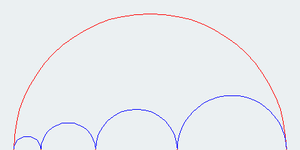Others Like “Divide and Conquer: Proving Pick's Theorem for Lattice Polygons” (top 20 results)
|
Aerodynamics and Hockey: Does the Force of Drag Have an Effect on the Distance the Puck Will Travel?
Think of a way to launch the puck with a reproducible force, and examine the effect of launching the puck in different orientations on the distance it travels. For more information on the physics, see Haché, 2002.
Read more
We've all heard that "practice makes perfect," but what is the best way to practice? For example, does "mental practice" do any good? You'll need at least 9 volunteers for this project. Pick a well-defined sports activity, with a measurable outcome, such as shooting basketball free-throws (measure number of shots taken and number of shots made), or balancing on one foot on a slightly raised beam (measure how long you can do it; if it's too easy, try closing your eyes). Test all volunteers…
Read more
Use your Internet sleuthing skills to learn about solar system objects. Create a table of measurements of moons and asteroids in order to determine if there is a size threshold for roundness. A good source of information would be an online guide such as The Nine Planets (Arnett, W.A., 2006). You'll find information about planetary satellites, including dimensions and accompanying pictures. From the pictures, classify the satellites and asteroids according to how round they are. Can you think of…
Read more
How do you turn a 2-dimensional piece of paper into a 3-dimensional work of art? Origami, the classical art of Japanese paper folding, is loaded with mathematical themes and concepts. What are the common folds in origami, and how do they combine to create 3-dimensional structure? Can you classify different types of origami into classes based upon the types of folds they use? Can you show Kawasaki's Theorem, that if you add up the angle measurements of every other angle around a point, the sum…
Read more
This a straightforward, but interesting, project in geometry. It is a good first proof to try on your own. You should be able to figure it out by yourself, and you'll gain insight into a basic property of circles.
Figure 1 below shows a semicircle (AE, in red) with a series of smaller semicircles (AB, BC, CD, DE, in blue) constructed inside it. As you can see, the sum of the diameters of the four smaller semicircles is equal to the diameter of the large semicircle. The area of the larger…
Read more
This project can apply to soccer, hockey, baseball and many other sports. What is the effect of stopping the kick/shot/swing at the moment of impact vs. following through? Think of a way to measure the outcome in each case, and explain your results. (idea from Gardner, 2000, 83-85; for more information with regard to specific sports, see: Barr, 1990, 12-14; Gay, 2004, 142-144; Adair, 2002, 30.)
Read more
When the punter is trying to hit the "coffin corner" (within the opposing team's 10-yard line), out of bounds, what is the best angle to kick the ball for correct distance and maximum "hang time?" (For more information on the physics involved, see: Gay, 2004, Chapters 4 and 5.)
Read more
Make a pinhole projector (see Measuring the Diameter of the Sun and the Moon). Use the pinhole to project an image of the Sun onto a wall or a piece of paper. Do you notice any dark spots on the projected image? Trace the projected image and count the dark spots. Use your pinhole projector to make images of the Sun at the same time of day for several consecutive days. How does the pattern of spots change? Can you use your data to figure out how fast the Sun rotates? Sunspot activity rises…
Read more
You're playing Monopoly with a friend, and you've already got Park Place and you really, really want to get Boardwalk. If you're on Pacific Avenue, what are the chances you'll reach your goal? Here's an easy project that will show you how to find out.
Read more
Maybe this has happened to you: you're going shopping with one of your parents and the parking lot is really crowded. You're helping out, scouting for an empty space. You see someone heading toward their car, taking their keys out, and you point them out. At last, you're going to get a spot. You wait for the person to pull out so you can park. Does it take them longer because you're waiting? Do they move out faster? Or does it just seem that they do? For information on people's…
Read more
|
Explore Our Science Videos
Reaction Rates: When Surface Area Matters! Lesson Plan Introduction
Paper Roller Coasters - Fun STEM Activity!
Slow Motion Craters - STEM Activity





